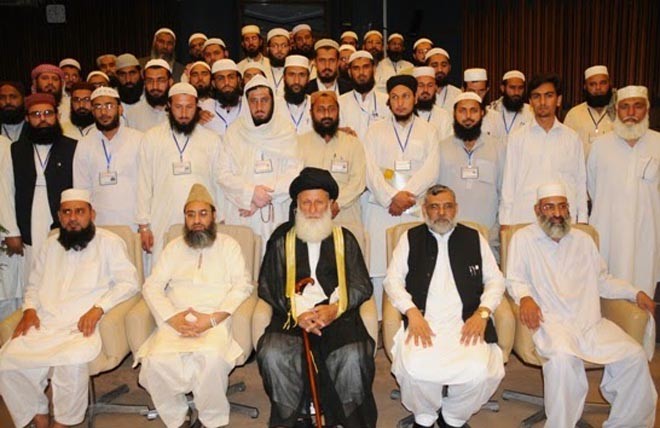
There are varied opinions about the constitutional status of the Council of Islamic Ideology and the Senate wants a serious debate on the issue

The Council of Islamic Ideology (CII), a body that was set up with the express purpose of ascertaining whether the country’s laws were according to Islamic injunctions, is under scrutiny for the past few years. Legally, the council ceased to exist after fulfilling its assigned obligation after having reviewed all laws. But it continues to work, calling itself a ‘necessity’ under ‘religious obligation’.
The matter of the council was brought up in a recent meeting of the Senate of Pakistan by Pakistan People’s Party’s Senator, Farhatullah Babar, while discussing the annual reports of the council presented before the upper house. Babar has also desired to refer this matter to the law and justice standing committee of the upper house to determine the legal status of the council and its reports.
Under the chairmanship of Raza Rabbani, the Senate for the first time allocated time to discuss three annual reports of CII from 2009-2012. Quoting the 2011-12 annual report of CII, Babar said the council has clearly admitted that after the submission of its final report in December 1996, it was no longer constitutionally required to continue submitting annual reports to the parliament.
Page seven of that annual report of the council, also available with TNS, reads: "There was no reason and constitutional obligation to prepare interim report every year after submitting final report in 1996. However, in continuity of this organised work and to make the report beneficial it has been considered (by the council) appropriate to continue with the tradition of compiling annual report".
"Even if the council has to stay, its task should be limited to advice and that too when asked by the parliament and not on its own. There should be a careful selection of members including progressive people, says Babar. "It is an advisory body and cannot strike down a law, especially in the presence of Federal Shariat Court."
The CII was established as an advisory council in 1962 under Article 199 of the Constitution of the Islamic Republic of Pakistan 1962. Later, the advisory council was re-designated as the Council of Islamic Ideology in Article 228 of the 1973 Constitution with its functions given in Article 230, followed by the Rules of Procedure (Article 231). According to the constitutional requirement, the CII took seven years to review the laws and the parliament took 17 years to discuss this report. Its final report was taken up by the parliament in 1996.
Babar says a Federal Shariat Court is already tasked to examine the laws and it can strike down any law on the touchstones of Islam.
According to CII’s 2008 report, 90 per cent of the laws in the country were not in conflict with Islam. Only 10 per cent were to be reviewed by the parliament. An examination of the remaining 10 per cent laws is now in the domain of the parliament and not the council.
Senator Babar objects to the role of CII in issuing controversial pronouncements including the one in March 2014 that decreed that current laws forbidding child marriage were un-Islamic.
Before the formation of the CII, there were two other institutions set up to deal with the problems related to the constitution. There was a Law Commission in 1956, and a Board of Talimat-i-Islamiyya. Later, in 1952, some clerics offered 22 points as guidelines in connection with the Objectives Resolution of 1948. In the 1970s, Zulfikar Ali Bhutto’s government was forced to include Islamic provisions in the Constitution of 1973. A full chapter on the council, with an increased strength of religious scholars, affected the composition and functions of the council.
During the military dictator General Ziaul Haq’s regime, Islamisation of laws began. And most of the space in the council was captured by clerics, replacing the tradition of appointing lawyers and retired judges as law experts in the council. Even though the constitution advised otherwise, the strength of religious scholars increased, and the Chairman of the Council was no longer required to be a judge as the earlier rules prescribed. Further, under the two previous political regimes, religio-political parties and figures have been accommodated in the council adding to its political overtones. The council is gradually performing the role of "Dar al-Ifta" in Deoband -- a body issuing decrees on different issues and adding religious pressure on governments regarding different legislations and polices.
"Apparently, it is a matter of interpretation of Article 230 (4) of the Constitution. The Islamic Council shall submit its final report within seven years of its appointment, and shall submit an annual interim report. The Article does not mention a date or period for the council but it is implied that the function is conditional and temporal. It does not say clearly if the council continues after submission of the Final Report. It can be interpreted both ways. It is up to the parliament or the Supreme Court to interpret it," says Dr Khalid Masud, former chairman of the CII.
Dr Masud says that in view of the continuing politics of Islamic law in Pakistan, the council and its role has been already politicised. Political interference in the council has dragged it into sectarian politics. "Under the circumstances, it will not be a good idea to dissolve it. Only immediate and serious attention of the parliament in the affairs of the Council can save it from further deterioration."
Sitting Chairman CII, Maulana Mohammad Khan Sherani, is a veteran member of the Jamiat Ulema-e-Islam Fazlur Rehman group (JUI-F). He has been a member of CII twice before. "The council’s role is defined in the constitution that clearly says that it will continue to give its advice," says Sherani. He says that Article 230 (4) deems the council a necessity.